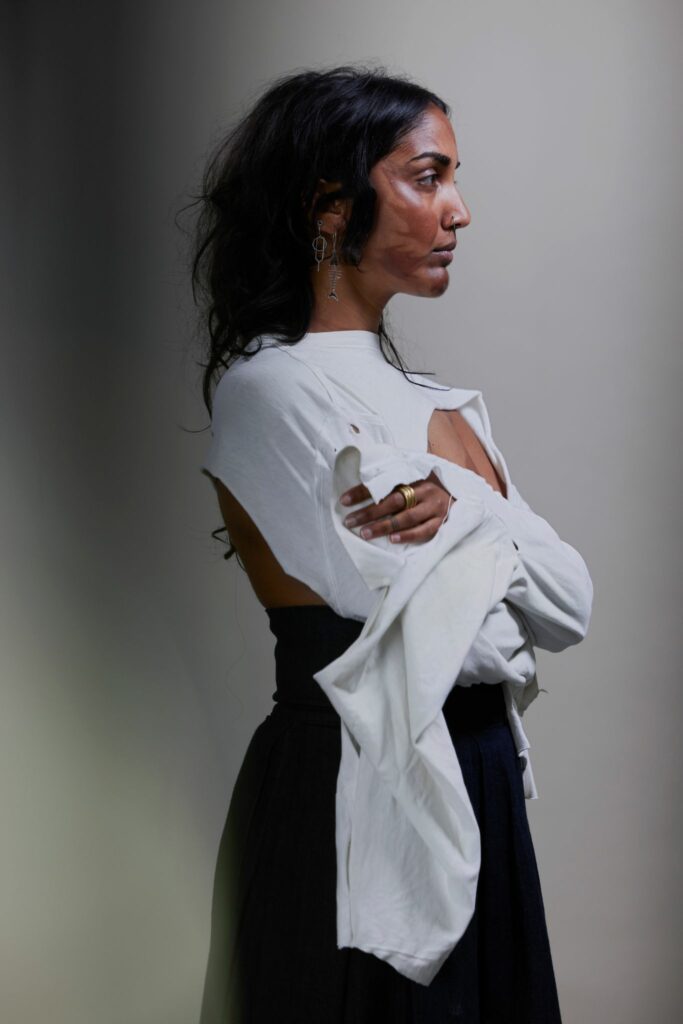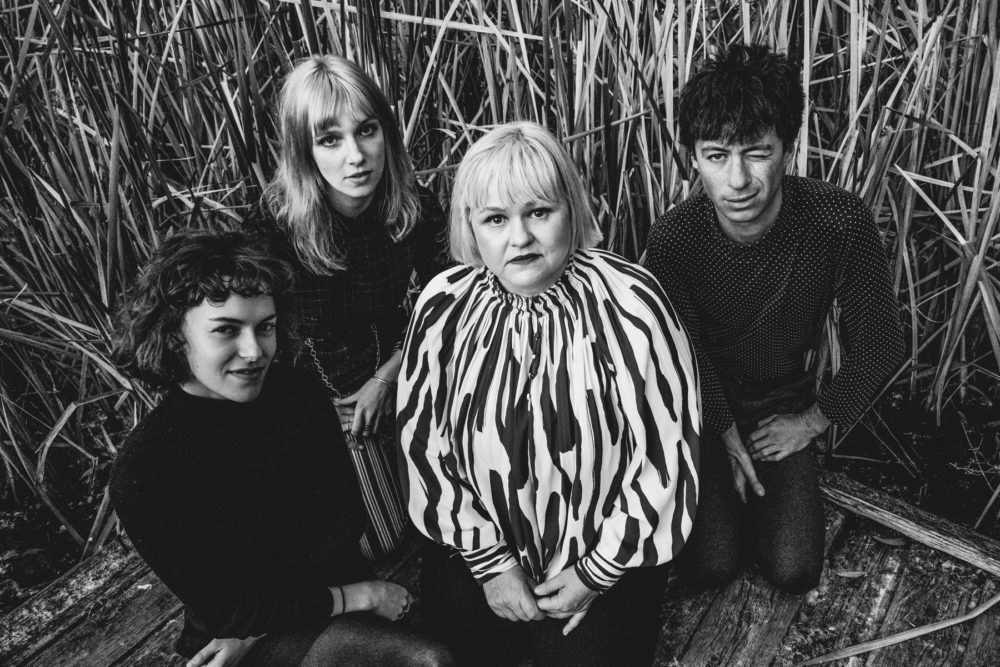

For Aarti Jadu, sound – whether voice, instrument or digital manipulation –is how they make sense of the unmapped inner geography connecting their Indian heritage and their own identity as a first-generation Australian. Jadu’s explorations have manifested as trauma-informed workshops for voice and somatics, and neuroscience-informed artworks that explore how the interplay of voice, music and physical space can convey human experience and perhaps address emotional trauma. Jadu is an anthropologist, an explorer, and an experimentalist when it comes to sound – and on February 11, they released their debut album L’Ecole De La Caz via Heavy Machinery Records.
“The concept was to try and make it like an alien choral folk album,” Jadu states. It was made under the multi-directional pressures of COVID lockdowns, an unstable home situation, financial pressures, and their own personal expectations, doubts and insecurities. But with funding from Flash Forward, the opportunity to make new work was impossible to pass up.
“You do what your life’s calling is and the gamble is that you might not feel stable,” they concede. “I called it ‘school of house’ in French; learning what it is to reinvent the idea of home and house and strength in the self as opposed to the material world around my body.”
Jadu was raised in Perth before following their brother across the country in 2011 to settle in Melbourne. Though they loved singing, their life’s calling seemed to be another creative form at first.
“I just came out of studying fashion and did an internship with a fashion designer here,” Jadu recalls. “Through doing that and seeing how much of my energy was not being used for singing, which was a really important part of my being, I decided I should put more focus on music and make fashion a secondary creative outlet.”
For nine years, they’ve been a student of Vinod Prasanna, a performer and teacher of traditional and contemporary Indian devotional music. “I started off in devotional music, singing chants and group songs [or] bhajans, which are primarily used to activate a spiritual or deeper sense of self with a community. Only when I was 20 or 22, I started writing songs of my own that were more poetic and not for that purpose, but for my own enjoyment.”
Yoga, too, has been elemental in their mind-body-spiritual practice. Jadu’s teacher, Nina Alfers, is depicted on the album artwork, having planted the concept of finding home within the body within Jadu’s mind.
“I think yoga reminds one that it’s always a practice and that it cannot be sold and that we always have a responsibility, and an opportunity and right, to reach for something that is spiritual, and that comes from within through expressing outwardly, a recognition of ritual,” Jadu says.
Jadu’s intention on their first album was to make sense of how their two worlds – making devotional music and their artistic and electronic works – could share a language and an intention. “How do I create devotional music and also these wider spaces of my self in a club, or a performance space where the shrine is the person as opposed to this other, greater, higher existence?” she asked herself.
When the State of Victoria/City of Melbourne Flash Forward project arose, providing funding to create an album to a brief deadline (a couple of months maximum), Jadu was conflicted since they had another artistic commission and a course in public art creation underway simultaneously. On the other hand, they felt compelled to create a cohesive body of work that channeled two of their biggest fascinations: Auto-Tune and devotional music. These explorations into the digital manipulation of sound, voice and instrumentals inform L’Ecole De La Caz through each of its seven hypnotic tracks.
First single “IT/THAT” feels akin to fka twigs’ strange, digital, ghostly RB harmonies, punctuated with breathing, gasps, moans and whispers. As the twisting, modulating voices in their upward lilting melodies – both celestial and artificial in tone – layer and build, they embody the nature of gospel, hymns, chanting and sacred ritual. It begs the question: are these sounds sacred purely because they mimic all the elements of sacred music? Does it matter whether these sounds are made by human or machine? And then, where do we define who exists, who is holy and who is laity, and why do we insist upon divisions when all beings are drawn to the very natural, organic act of making music in harmony and praise whoever our Gods or higher powers are?
Arranged like a choral album, but with a twist, Jadu used multiple Auto-Tune sources to create an Auto-Tune choir of some sort. “Choir music indicates that there’s a sense of leaving yourself and joining others and becoming one big instrument rather than having individual ego or something to say that’s separate to the other,” Jadu explains.
It’s a unique sense of comfort, one Jadu desperately needed when circumstances left them without a stable home. The impermanency was emotionally exhausting, and as Jadu speaks about it, it sounds like it remains a thorn in her soul. “Unfortunately for many musicians, it’s always a transient space – to have the rug pulled from under your feet so many times,” they reflect.
But despite all that, Jadu offers the sense of soothing too often in short supply on L’Ecole De La Caz. Even without intellectualising, or trying to tackle the big existential queries Jadu has been in dialogue with in the making of this album, it is thoroughly immersive and transportive. Listen without analysis, be moved, and perhaps be transformed subtly and incomprehensibly.
For the string arrangements, Jadu called upon Aurora Darby and Esther Henderson. Their vocal ensemble comprised Abbey Howlett, Aurora Darby, Emma Ovenden, Joli Boardman, Melanie Taylor, Olive Yaah, Siobhan Housden, Stav Shaul, Xan Coppinger and Yannick Rosette.
“A lot of the fleshing out was done at home in the beautiful room that I eventually left, so it was precious to have it as a time capsule. We set up in an empty room in the house [in Coburg]… to record strings in and the choir,” Jadu says. “I was fortunate enough to also jump into a studio and track some of the vocals that I needed to sound fairly intimate and clean.”
They’d been accustomed to Auto-Tune pedals after becoming hooked on Algerian and Spanish pop songs that heavily relied on vocal tuning. They’d been experimenting with manipulating their vocals for a couple of years and gigging with the pedals between lockdowns.
The heavily treated vocals make it difficult to differentiate between human and computer, inviting listeners to question why and how they are drawn to this sound that is both ancient and familiar, but also strangely artificial and engineered.
“I varied the microphones considerably and I also used Auto-Tune or hard tuning effects – what you’d hear on Cher or T-Pain,” they clarify. “I find Auto-Tune a very sophisticated pedal and I used software and hardware to create various version of that. Some of the synths sound like vocals and some of the vocals sound like synths. That was a whole lot of fun to try things out.”
Jadu used Logic to make the whole album and the Antares plug-in, as well as the Boss VE-20 Voice Manipulator and looping station. “I just enjoyed how crisp and tacky to process it through hardware before putting it into the digital world,” they explain.
The result on L’Ecole De La Caz is indeed an alien choral folk vibe. After the intensity of making it, discovering what they knew and didn’t know, and proving they could improvise under pressure, Jadu says it’s a relief to share it with the world. “I didn’t want to let it go. I wanted to keep fixing it,” they say. “But it’s a good process to let it go and I was quite happy to move on and make something else.”
Follow Aarti Jadu on Instagram for ongoing updates.




